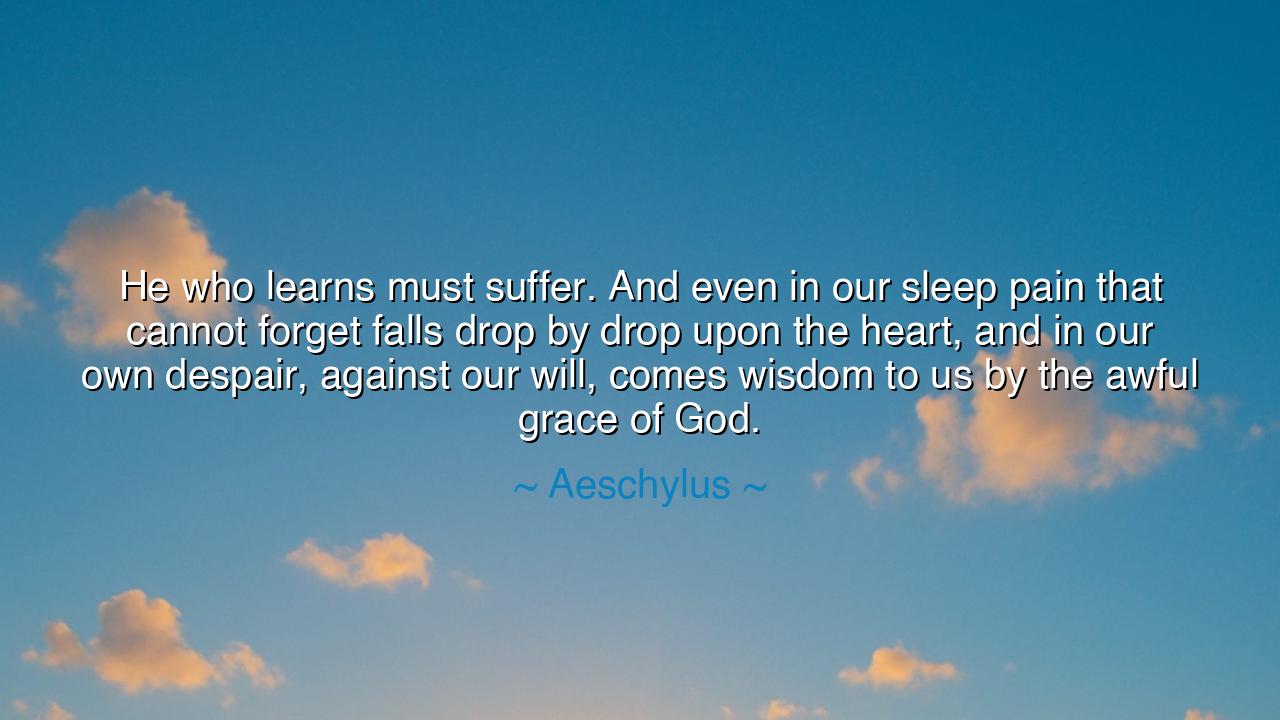
He who learns must suffer. And even in our sleep pain that cannot
He who learns must suffer. And even in our sleep pain that cannot forget falls drop by drop upon the heart, and in our own despair, against our will, comes wisdom to us by the awful grace of God.






“He who learns must suffer. And even in our sleep pain that cannot forget falls drop by drop upon the heart, and in our own despair, against our will, comes wisdom to us by the awful grace of God.” — thus spoke Aeschylus, the father of Greek tragedy, whose words echo through the ages like thunder across a darkened sea. This ancient poet, who fought at Marathon and witnessed the rise and ruin of men, saw clearly what many still deny: that suffering is the crucible of wisdom, and that no soul becomes great without being broken first. In this single passage lies the eternal law of human growth — that learning, true learning, is not of the mind alone, but of the heart scarred and tempered by pain.
The origin of these words lies in the ancient tragedy Agamemnon, the first play of Aeschylus’s famed Oresteia trilogy. Written in the fifth century before Christ, it was a time when the Greeks sought to understand the moral order that governed gods and men. Aeschylus, through his chorus, gave voice to this profound insight: that wisdom is not freely given; it is earned through suffering. To live is to struggle, to err, to endure loss and guilt and grief — and only through such ordeals does the soul awaken to truth. The poet calls this process “the awful grace of God,” for though divine, it comes clothed in pain. Grace does not arrive as comfort, but as trial; it does not soothe, but refines.
To the ancients, this truth was sacred. The gods, they believed, did not grant understanding to the untested. Suffering was the anvil upon which the soul was forged. Aeschylus himself had known this intimately. As a soldier, he had seen comrades fall; as a playwright, he wrestled with the great questions of justice, fate, and divine order. His words are not those of despair, but of reverence — a recognition that pain is the divine teacher, that even unwilling hearts are shaped by it. “Drop by drop,” he says — not in torrents, not in chaos, but patiently, persistently, until the proud heart yields and wisdom takes root.
In this teaching lies a paradox both terrible and beautiful. We do not choose to suffer, and yet through suffering, we grow. We resist it, curse it, flee from it, and yet it pursues us — not as punishment, but as transformation. When Aeschylus speaks of wisdom coming “against our will,” he reveals the humility that every soul must learn. We do not find truth by conquering life, but by surrendering to it. The pain that cannot forget — the memory of betrayal, of loss, of failure — becomes the very soil from which compassion and understanding blossom.
History bears witness to this law. Consider Abraham Lincoln, who often quoted these very words of Aeschylus in his darkest hours. During the Civil War, when the nation was torn apart and his own heart shattered by the death of his son, Lincoln confided to friends that he found solace in this passage. “Pain that cannot forget” had indeed fallen upon him, and through it, he came to understand both the suffering of his people and the cost of mercy. His wisdom, born of agony, became the guiding light that led America toward reconciliation. Thus, Aeschylus’s ancient truth found new life in the soul of a modern leader — that through the grace of suffering, humanity rises to nobler understanding.
Yet this “awful grace of God” is not only for heroes or kings. It touches all who live long enough to love, to lose, to yearn. Every heart that breaks learns, in time, that the wound itself becomes the teacher. When dreams die, we learn patience; when we are betrayed, we learn discernment; when we lose what we love, we learn the sanctity of the moment. Wisdom, therefore, is not bestowed — it is distilled from sorrow. The one who suffers and yet remains open to love becomes radiant with a kind of divine gentleness that cannot be taught by joy alone.
So, my child, when pain visits you — as it surely will — do not turn away in bitterness. Do not cry out, “Why me?” but rather, “What am I being shown?” Know that every drop of sorrow falling upon your heart is shaping you into something greater. Do not seek to escape the lessons of suffering, for in them lies the slow, holy work of grace. One day, you will look back upon the wounds that once burned and see that they have become your teachers, your guides, your quiet sources of light.
For Aeschylus was right: learning and suffering are twin paths, bound together by the will of the divine. Through the night of despair comes the dawn of understanding. Through the grief that seems endless comes the wisdom that endures forever. This is not an easy truth, but it is the most necessary. Embrace it with courage, endure it with patience, and when the pain has done its work, give thanks for the awful grace of God — for it is through that grace that mortal hearts are made eternal.






AAdministratorAdministrator
Welcome, honored guests. Please leave a comment, we will respond soon